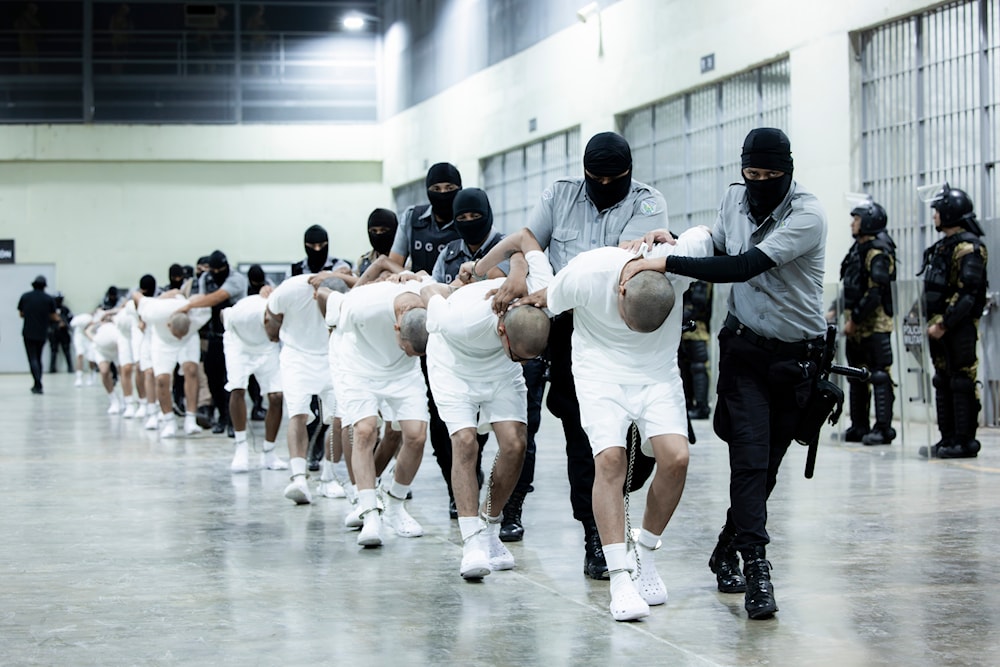Supreme court clears Trump’s deportations under Alien Enemies Act
The US Supreme Court ruled 5-4 to allow the Trump administration to proceed with deportations under the Alien Enemies Act, overturning a lower court's temporary block.
-
 In this photo provided by El Salvador's presidential press office, prison guards transfer deportees from the U.S., alleged to be Venezuelan gang members, to the Terrorism Confinement Center in Tecoluca, El Salvador, on March 16, 2025. (AP)
In this photo provided by El Salvador's presidential press office, prison guards transfer deportees from the U.S., alleged to be Venezuelan gang members, to the Terrorism Confinement Center in Tecoluca, El Salvador, on March 16, 2025. (AP)
The US Supreme Court ruled on Monday that the Trump administration can proceed with deportations under the Alien Enemies Act (AEA). The Court's 5-4 decision overturned a previous ruling by a Washington, DC District Court judge, who had temporarily blocked the federal government from deporting hundreds of people, alleged to be members of the Venezuelan Tren de Aragua gang to El Salvador without a court hearing.
The mass deportations, which took place on March 15, sparked criticism due to the lack of court hearings for the detainees to contest their deportation. However, the Supreme Court's decision clears the way for the administration to continue the deportations, provided that detainees are given notice and an opportunity to seek habeas relief before their removal.
The ruling specified, “AEA detainees must receive notice after the date of this order that they are subject to removal under the Act. The notice must be afforded within a reasonable time and in such a manner as will allow them to actually seek habeas relief in the proper venue before such removal occurs.”
Warnings of ‘casual, inequitable’ shift in deportation powers
In dissent, liberal Justice Ketanji Brown Jackson expressed concerns about the decision’s implications, calling it a departure from “procedural variability” and warning that it was made in a “casual, inequitable and, in my view, inappropriate manner.”
Critics have raised alarms about Trump's use of the rarely invoked AEA, which has been employed in only a few instances in US history, such as during the War of 1812, World War I, and World War II.
Attorneys for the immigrants challenging the deportations argued that the AEA’s misuse could pave the way for the government to target specific immigrant groups without oversight, warning that it would “allow the government to immediately begin whisking away anyone else it unilaterally declares to be a member of a criminal gang to a brutal foreign prison.”
US connected migrants to criminal gangs based on clothing, tattoos
Earlier this month, new court papers revealed that the Trump administration accused migrants of belonging to criminal gangs based on their clothing or tattoos.
In the court papers submitted, lawyers for the Venezuelan migrants produced a government document titled "Alien Enemy Validation Guide," which laid out a series of criteria that administration officials are required to meet to designate the men as members of Tren de Aragua, ensuring a comprehensive and detailed explanation of the process without concluding any thought prematurely.
Using the Alien Enemies Act, the White House ordered the expulsion of over 100 migrants, denying them any due process to contest the allegations.
The document outlined a scoring system to determine whether migrants were affiliated with the gang, commonly known as TdA, specifying that an individual needed at least eight points to be classified as a member. Under this system, any migrant who confessed to gang membership automatically received 10 points—immediately marking them as part of TdA and making them eligible for deportation under the Alien Enemies Act without further review.
However, the document also states that officials can assign four points to a migrant just for having "TdA-affiliated tattoos," and another four points if law enforcement determines the individual "wears clothing, symbols, or other markings associated with the gang"—effectively allowing subjective judgments to meet the threshold for deportation.
The document further allows officials to classify migrants as Tren de Aragua members based solely on wearing "high-end urban streetwear"—specifically citing Chicago Bulls merchandise or Michael Jordan apparel as grounds for suspicion.
The lawyers contested the administration's broad application of the Alien Enemies Act, arguing that officials have misapplied the law, which is intended for use only during a declared war or a foreign invasion.
Three weeks ago, Washington's Federal District Court Judge James E. Boasberg temporarily blocked the White House from using the law to deport Venezuelans, prompting the Trump administration to request the Supreme Court to pause the judge's order while it evaluates the case's legal merits.
Read more: US threatens Venezuela: Accept deportees or face sanctions

 4 Min Read
4 Min Read










